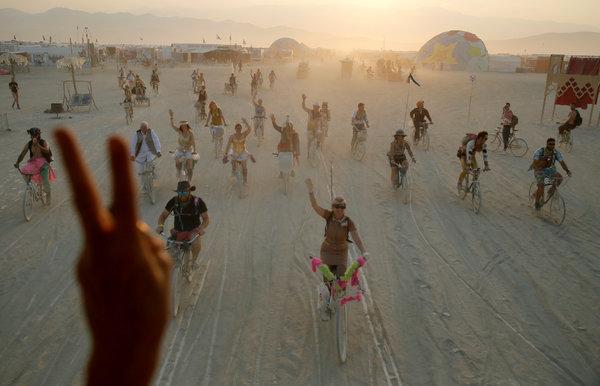Burning Man’s chief executive has disinvited one camp for wealthy attendees and warned a dozen others as it outlines steps the organization has taken to return the event to its egalitarian roots, according to a blog post the organization posted over the weekend.
Burning Man disinvited Humano The Tribe, a turnkey or “plug and play” camp that catered to the moneyed class and was cited for not complying with the organization’s requirement to not foul the environment. Twelve other camps received warnings. Burning Man, once a low-key gathering which now attracts celebrities and billionaires, is attended by 70,000 participants who gather to create music and art in the Nevada desert every August.
The announced changes also include adjustments to ticket pricing at the event, which will make it easier for an economically diverse crowd to attend. The executive, Marian Goodell, decried what she called “convenience culture.” Critics have contended the recent influx of wealthy attendees who pay to stay in prepackaged camps upend the ethos of radical inclusion and community the event was founded upon.
“Our job is to shine a light on an issue and do our part,” Ms. Goodell said in an interview Thursday. “Because you are building a community, you need to act like a community. You don’t have transactions and businesses. You don’t have velvet ropes.”
Critics and attendees who have seen Burning Man’s culture drift applauded the move. “It is a nice gesture to the Burner audience,” said Brian Doherty, the author of “This Is Burning Man: The Rise of a New American Underground.” “The question is what kind of experience do they want to provide? They listened to what the core audience wants.”

Burning Man participants waving as a person on an art car flashed them a peace sign as they biked through Burning Man’s Black Rock City in 2017.CreditJim Bourg/Reuters
“After negative reports from participants and nearly every Black Rock City operations team, we told Camp Humano that they are not invited back in 2019,” Ms. Goodell wrote in her post. She cited the camp’s strain on resources and “many complaints from neighboring camps.” Representatives for Humano did not return emails seeking comment on Thursday.
Humano, according to a brochure obtained by Mashable, charged as much as $100,000 for a two-bedroom unit with a bathroom and air conditioning last year. A smaller 160-square-foot tent cost $25,000.
Ms. Goodell said the recent changes had been in the works for two months and were not related to events at the Fyre Festival, where high-paying attendees were left stranded in 2017 on the Bahamian island of Great Exuma. Two recent documentaries about Fyre Festival have highlighted its organizational dysfunction.
The first Burning Man festival was held in 1986 on Baker Beach in San Francisco, where the founder, Larry Harvey, gathered a group of friends and set an eight-foot-tall wooden man on fire. The event moved to Black Rock Desert, about 140 miles north of Reno, four years later. Then, it was a relatively low-key gathering over Labor Day that embraced anticonsumerism. Nothing could be bought or sold except coffee and ice. (Mr. Harvey died last year.)
The New York Times Magazine described Burning Man in 1994 as “an excuse to party in the desert.” Over time the festival grew in popularity, attended by Silicon Valley millionaires and billionaires who arrived in private jets, hired laborers to pick up after them and built air-conditioned camps. They, too, hosted elaborate soirees attended by models and celebrities who posted photographs on Twitter and Instagram.
To attract a more diverse crowd, Ms. Goodell said, Burning Man is making changes to its ticket prices, which last year ranged from $190 to $1,200. In a survey of participants the organization released last year, the median household income for an attendee was tallied at $94,900.
Ms. Goodell said the organization would expand ticket applications for low-income attendees by 18 percent. She also said it would limit the number of high-priced tickets that could be bought by individuals. The idea is to make them readily available to a wider group of people.
Ms. Goodell warned, though, that the event’s wealthy attendees were not to blame for the culture shift. She pointed out that Burning Man had become for some businesses a counterculture marketing opportunity. “I recently heard rumors of more than one product or business launch happening on playa in 2018,” Ms. Goodell wrote in her post.
“Seriously, people,” she wrote. “This really isn’t Burning Man.”







